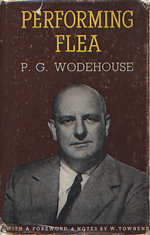 W
WSir Pelham Grenville Wodehouse, was an English author, humorist and scriptwriter. After being educated at Dulwich College, to which he remained devoted all his life, he was employed by a bank, but disliked the work and wrote magazine pieces in his spare time. In 1902 he published his first novel, The Pothunters, set at the fictional public school of St. Austin's; his early stories continued the school theme. He also used the school setting in his short story collections, which started in 1903 with the publication of Tales of St. Austin's.
 W
WPerforming Flea is a non-fiction book, based on a series of letters written by P. G. Wodehouse to William Townend, a friend of Wodehouse's since their schooldays together at Dulwich College. It was originally published in the United Kingdom on 9 October 1953 by Herbert Jenkins, London. The title alludes to a disparaging comment by the playwright Seán O'Casey, who, in a letter to The Daily Telegraph in July 1941, referring to Wodehouse's radio broadcasts from Berlin, wrote that "If England has any dignity left in the way of literature, she will forget for ever the pitiful antics of English literature's performing flea".
 W
WBring on the Girls! is a semi-autobiographical collaboration between P. G. Wodehouse and Guy Bolton, first published in the United States on 5 October 1953 by Simon & Schuster, Inc., New York, and in the United Kingdom on 21 May 1954 by Herbert Jenkins, London.
 W
WThe Globe By the Way Book is, to quote a contemporary source: "a broad smile, more or less, chiefly more, from cover to cover. It ‘whips hypocrisy’ and skits at the follies and fancies and foibles of the day with a light, not to say lightning touch, which tickles a lot but never stings. ‘Buy a bee and grow your own honey. If one bee is not sufficient get two bees, and so on.’ ‘The best way of telling a toadstool from a mushroom is to make the servant eat it. If she turns blue it is a toadstool.’ But to quote more would be giving the book away, whereas it should cost a shilling a copy. Some paper people I know want the earth; others take the Globe; but week-enders cannot afford to be without the ‘By The Way Book’ if they mean to die happily.” "
 W
WLouder and Funnier is a collection of essays by P.G. Wodehouse, first published as a book in the United Kingdom on 10 March 1932 by Faber and Faber, London.
 W
WOver Seventy is an autobiographical work by P.G. Wodehouse, including a collection of articles originally from Punch magazine. It was first published in the United States on 3 May 1956 by Simon & Schuster, Inc., New York under the title America, I Like You, and in the United Kingdom, in a considerably expanded form, on October 11, 1957 by Herbert Jenkins, London, with the Over Seventy title and the subtitle An Autobiography with Digressions.
 W
WPerforming Flea is a non-fiction book, based on a series of letters written by P. G. Wodehouse to William Townend, a friend of Wodehouse's since their schooldays together at Dulwich College. It was originally published in the United Kingdom on 9 October 1953 by Herbert Jenkins, London. The title alludes to a disparaging comment by the playwright Seán O'Casey, who, in a letter to The Daily Telegraph in July 1941, referring to Wodehouse's radio broadcasts from Berlin, wrote that "If England has any dignity left in the way of literature, she will forget for ever the pitiful antics of English literature's performing flea".
 W
WWilliam Tell Told Again is a retelling of the William Tell legend in prose and verse with illustrations. The main prose element was written by P. G. Wodehouse, while Philip Dadd supplied the frontispiece and 15 full-page illustrations, all in colour. The 15 illustrations were each accompanied by a verse written by John W. Houghton, who also wrote the prologue and epilogue in verse.